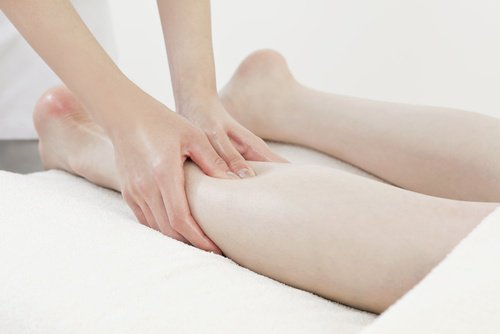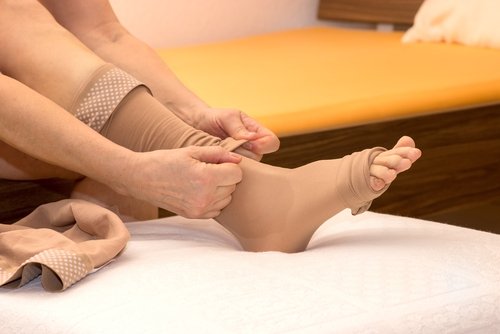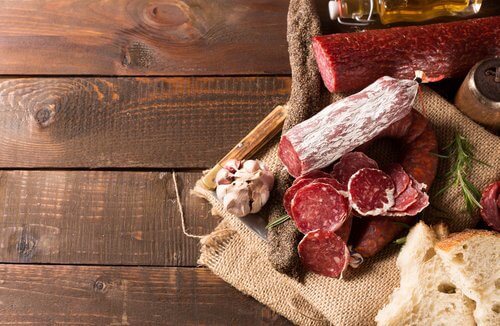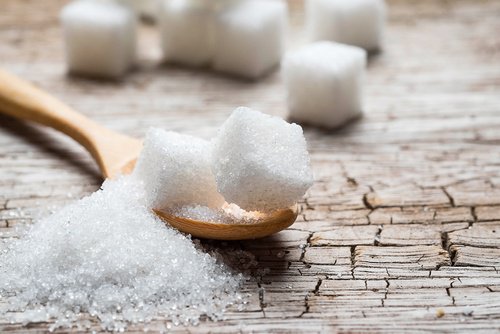Fluid Retention: What Foods to Avoid

Fluid retention, or edema, is a very common problem caused by an unbalanced diet, being too sedentary, and not drinking enough water. Today, we’re going to tell you which foods you should avoid if you have this issue.
When is it fluid retention?

As a first step, you should know that fluid retention involves an imbalance between the forces that regulate how fluids move throughout different areas of your body. What happens as a result is that water builds up in your body’s tissues.
If you can’t eliminate the water, it builds up in certain areas. Here are some of the big things that can make it worse:
- A lot of sodium in your diet
- Poor circulation due to being sedentary
- Hormonal imbalance
- Lack of exercise
If you have fluid retention issues, you can detect them easily, since you’ll notice weight gain and feel the swelling in various parts of your body (especially your legs and ankles).
To test it, all you have to do is press on your skin for a few seconds. When you take your finger away, if there is a white mark that stays there for a time, it’s because you have edema.
To prevent or reduce this fluid imbalance in your body, you have to follow a strict low-sodium diet and increase your intake of liquids and diuretic foods (water, juice, vegetables, fruit, etc).
It’s also good to exercise at least twice a week.
Foods to avoid if you have fluid retention
When you have this problem, it’s not enough to just exercise and stop eating salt. You also need to avoid eating certain foods that have the tendency to increase the amount of fluid in your body.
Here are some examples:
Alcoholic drinks
Even if you go to the bathroom right after you drink them, a lot of what you ingested builds up in your body (including sugar). Alcohol triggers fluid retention in the stomach and legs. A glass of wine per day isn’t an issue. The problematic drinks are: cocktails, beer, or anything else with a high alcohol content, several times per week.
You might like: Drink a Glass of this Drink Before Going to Sleep and Reduce Belly Fat
Lunch meat

These are made with a very high amount of sodium. Besides being high in fat, they cause fluid retention. When you eat cold cuts, you’re “coating” your artery walls and increasing the risk of heart attack.
Highly salty cheese can go in the same category. This is usually the kind of cheese that comes with the cold cuts on a platter, along with sausage, smoked ham, and bacon.
Common snack foods
Potato chips and other similar products contain a lot of salt to help enhance their flavor.
They’re also so addictive that it’s hard to stop at one serving…You end up finishing off the whole bag!
If you’re dying for a snack, we recommend choosing sunflower seeds, nuts (like walnuts), fruits, vegetables, or vegetable soups (garbanzo, eggplant, etc).
Refined sugar

Many products you find on the shelf today contain high amounts of sugar or sweeteners.
Just like with salt, if these components enter your body, it can’t properly eliminate fluids, which triggers bloating.
It’s best to reduce your intake or look for more natural alternatives (like stevia, honey, or cinnamon) to flavor your food.
White flour
People with a diet made up of pasta, pizza, crackers, or bread are the most likely to deal with issues related to fluid retention and weight gain.
Refined flour has carbohydrates that build up in your body and stop your kidneys from working like they should.
These compounds increase the amount of water in your body by slowing down kidney function. Choose whole wheat products instead, or reduce your intake.
You’ll see results in no time.
Highly processed products

You don’t realize what you’re eating, and even if you’re unaware of it, you‘re encouraging fluid retention with these foods.
Try to stick to homemade meals, cook a little more (even if it’s just a few times a week), and avoid highly processed foods.
This may be tough because many people’s “comfort foods” fall into this list, but step by step you’ll be able to nourish yourself better.
Don’t pass the salt
Don’t salt your food too much while you’re making it, or when you’re sitting down at the table.
A good strategy is to not even put the salt shaker on the table. If it’s not in front of you, it’ll be easier to avoid the temptation.
Another option is to season your food with herbs, lemon juice, or olive oil. They’ll be healthier, tastier, and you’ll lower your risk of fluid retention and other conditions.
We recommend: Fight Fluid Retention Banana Smoothies
What should I eat if I have fluid retention issues?
Along with reducing or avoiding your intake of all the foods we just mentioned, we suggest adding these things to your diet:
- Water ( 8 to 12 cups a day)
- Natural sweeteners (stevia, agave)
- Fruit (watermelon, grapefruit)
- Herbal teas (chamomile, green tea, mint)
Give them a try!
All cited sources were thoroughly reviewed by our team to ensure their quality, reliability, currency, and validity. The bibliography of this article was considered reliable and of academic or scientific accuracy.
- Unterberg, A. W., Stover, J., Kress, B., & Kiening, K. L. (2004). Edema and brain trauma. Neuroscience. https://doi.org/10.1016/j.neuroscience.2004.06.046
- O’Brien, J. G., Chennubhotla, S. A., & Chennubhotla, R. V. (2005). Treatment of edema. American Family Physician. https://doi.org/10.1001/jama.1939.02800260081028
This text is provided for informational purposes only and does not replace consultation with a professional. If in doubt, consult your specialist.








